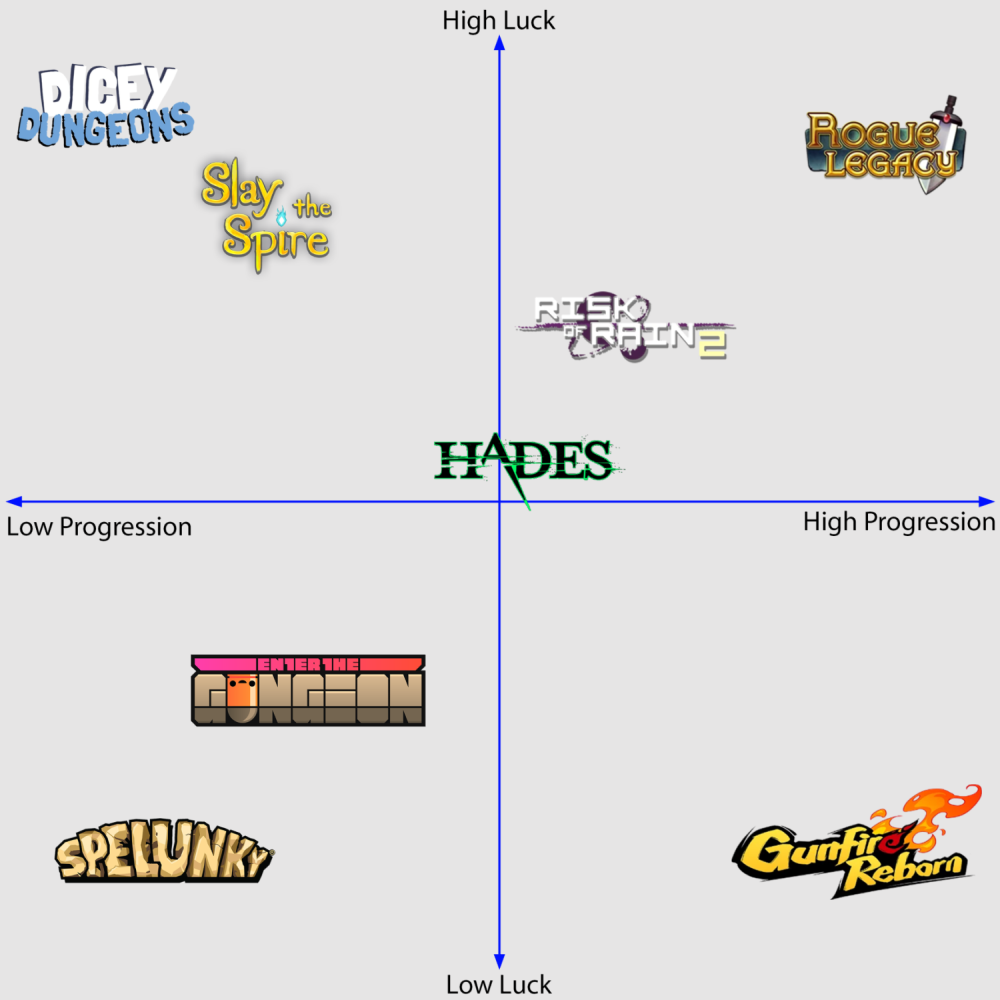The Roguelike Compass
One night not too long ago I wanted to play a Roguelike game. But which one? Seems like a simple choice but looking at my Steam library I realized that the decision was not so straight forward. There are a great many Roguelike games and the player experience between them can vary heavily. Was I in the mood to do a few runs and get some upgrades for my overall progression, or did I want a more focused run that would require careful play to complete - knowing that if I failed there would be little in terms of tangible rewards? And how much luck was I prepared to contend with?
With how large the "Roguelike" genre has gotten I realized we should do more to further define the genre so that players can make more informed decisions on purchases. This would help provide players with gameplay and emotional experiences that are more accurate to what they are looking for on a more consistent basis.
The First Argument: Progression Rewards
Progression rewards, I believe, is the most important distinction within the Roguelike genre, and defines the difference between a “Rogue-like” and a “Rogue-lite”. “Rogue-likes” are not going to reward players directly between runs with permanent upgrades very often. “Rogue-lites” will do the opposite giving players a consistent drip of rewards between runs that will increase their power level, open up new options and content, and generally increase their overall chances of victory. This difference creates a huge change in how the game feels to play.
Games on the “Rogue-like” side of the genre often require more focus and precise play. They tend to be less forgiving and offer a greater overall challenge. However, the player has close to or completely full power from their very first run. In theory the player could complete the game on their first run. Players will be improving their overall game knowledge with each run, and once accumulated, use their built up knowledge and skill to put together a winning run. The rewards between runs are intrinsic as the player becomes more skilled with attempts and comes closer to victory.
The “Rogue-lite”, on the other hand, will directly reward the player's attempted runs extrinsically with in game rewards, buffs, and unlocks. However, the player will start with only a fraction of the power that they will eventually accumulate and may need to realistically complete the game, meaning the player will be required to make many runs that have no real shot at a full victory in order to accumulate enough power. Depending on the type of player you are this difference may make or break a game for you.
That night I was feeling lower energy and wanted to relax more with a game, so I decided to play a "Rogue-lite" and just get some rewards from a few runs without the pressure to try hard and go for a full victory with each attempt.
The Second Argument: Luck
Due to the genre’s heavy usage of procedural generation luck is inherent to the Roguelike genre, and is the second most important distinction to make. While playing a Roguelike players must contend with randomly generated content and challenges such as room layouts, enemy placements, enemy behaviors, weapon drops, item drops, and upgrades to name a few. Some games will try and keep luck under control and provide a normalized gameplay experience for players. Others will lean further into the luck aspect by allowing high powered synergistic builds, or playing off random mechanics such as card drawing and dice rolling.
Games with high luck will usually require many runs to get that “perfect” run where everything comes together in the players favor. These games can also result in the opposite outcome where everything seemingly goes against the player. The amount of luck required to complete the game makes a huge difference in how it feels to play that game.
With the distinctions of player progress and luck I realized that you can chart roguelike games based on these crucial aspects to understand what type of roguelike a given game is, and what gameplay experiences to expect from it. Thus the Roguelike Compass was born.
The Roguelike Compass
The Roguelike Compass is a tool for better defining a given game in the genre. We simply plot the game along two axes. The X-Axis measures the amount of player power progression in the game, while the Y-Axis measures how much luck the game has.
Player Progression on the X-Axis measures how much the player can (and must) increase the power of their character through leveling up, between run upgrades, or other means of permanent buffs. On the right side are games with high amounts of permanent buffs that can be earned and are required to finish the game. On the left side are games with little to no permanent buffs and instead the player starts with everything they need to finish, they just need to be knowledgeable or skill full enough to get through.
Along the Y-Axis we have a measure of luck, on the top are games high in luck and randomness while on the bottom we have titles with minimal luck.
Where do your favorite games land on the chart? Which type of Roguelike player are you?
